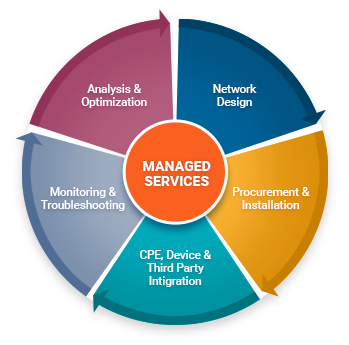Managed Service Provider: The Definition
An MSP (Managed Service Provider) is an IT service company which provides, on a proactive basis, managed services to end users and organizations. Managed services include hosting and managing servers, network and specialized applications for clients. MSPs, in most cases, own the entire physical back-end infrastructure and also would provide resources to their clients. All this is done remotely over the internet and this helps clients improve their operations and cut costs as well. Managed services provided by MSPs can be seen as an alternative to the break-fix or on-demand outsourcing model where services are provided on-demand services and the client is billed for the services provided.

A Brief History of Managed Services
The history of managed services starts with break-fix services; there would be small companies, mostly comprising of self-taught network amateur-turned-pros, that would help service small networks. When something went wrong, the company would call and these people would come running to fix it. Gradually, as time went on, the best among such support people developed procedures and programs to periodically come on-site and then do system reviews, of logs, user information etc and probe for issues that they could mend before they turn big problems. Around the 1990s, we could see MSPs evolving, with the emergence of the ASPs (Application Service Providers). The first systems that MSPs used to manage and monitor clients' servers and networks were expensive; hence they could be used only for big companies. Managed services, in fact, began with Fortune 500 companies and their huge networks. Eventually managed services turned cheaper and were made available to small to medium sized businesses as well. From the initial stage, when managed services meant just remote monitoring and management of servers and networks, the scope services rendered by MSP's has today expanded to include many more things- mobile device management, managed security, remote firewall administration, security-as-a-service, and managed print services.
How Managed Services differ from the Break-Fix method
The break-fix method, as the name itself suggests, waits for things (servers, systems or other critical networking devices) to break or fail and then seeks to fix them. On the other hand, managed services seek to prevent issues before they disrupt employees, management and/or clients. MSPs delivering managed services seek to ensure that clients don't fall behind in keeping up with things and also that the clients don't face an IT outage or a big issue that could negatively impact their business. Managed services focus on things like backups, patches and security.
Why Break-Fix has turned irrelevant for businesses
The break-fix method is all about fixing issues as they occur and not about preventing issues from happening. This would adversely affect the performance of client companies and cause losses as well. Businesses today cannot afford to rely on such break-fix solution providers; they depend on having a reliable and non-failing IT infrastructure. Moreover, they can't have separate service providers handling different areas of the system, which would actually be a bit complicated and time-consuming for them. Thus the break-fix method has turned rather irrelevant for them and most businesses today rely on MSPs.
Are Managed Services costlier than Break-Fix Services?
Managed Services are in fact mostly cheaper compared to the tradition break-fix services. Include the true cost of downtime and that itself would show that depending on managed services is overall cheaper. Moreover, MSPs that provide managed services do so through remote monitoring and remote maintenance rather than physically visiting customer sites frequently. That helps them offer better services at a lesser cost.
How MSPs price their services?
MSPs usually go for a flat-rate monthly pricing system, which is mostly based on the services included in the program offered. The number of devices covered would also be considered and different packages would be worked out at different levels. While basic services by MSPs mostly start with a simple monitoring service, ie, notifying clients of issues and letting them take care of the same themselves, there are providers that offer fully managed services ranging from alerts to problem resolution. The costs are planned accordingly.
Managed Services- The benefits
Managed services come with many real, notable benefits....
- Helps discover and fix problems before they negatively affect businesses.
- Helps businesses control and cut overall operating costs with the flat-fee billing model.
- Manages and monitors 24x7, for the client(s), all devices, vendor relationships, internet slowness/outage issues, websites etc, thereby giving businesses an additional level of comfort and security.
- One of the notable benefits of managed services is that it offers cost-effective access to enterprise-level support.
- A major advantage is that it assures minimized downtime, for the client(s).
- Helps client(s) focus more on the business and not on the technology. The MSP takes care of the technology aspect.
- Overall, ensures increased operational efficiency for the client(s) and peace of mind as well, since they can rest assured that things are being monitored and issues would be detected before they cause any big loss.
